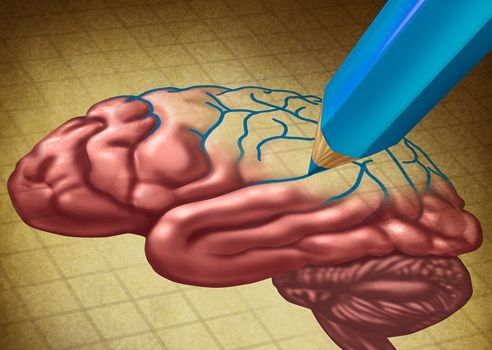Reading time: Less than 3 minutes
Did you know you could rewire your brain? And doing so might just be the first step you need to take to become a better writer…
I’ve always been deeply fascinated by the human brain. Perhaps never more so than following my two strokes in 2002 and 2007.
Despite having a healthy lifestyle and such freakishly low blood pressure that doctors often tell me to eat more salt (!), I had these strokes as a relatively young person — in my mid-40s and early 50s.
My doctors have been unable to figure out why this happened. Still, I’ve been lucky. No paralysis. No major brain-gaps. My major deficit? My handwriting is now unreadable. (Luckily I have a computer that works just fine.)
Some years ago I read Jill Bolte Taylor’s uplifting book, My Stroke of Insight. More recently, I’ve flipped through The Brain that Changes Itself by Norman Doidge and You are Not Your Brain by Jeffrey Schwartz and Rebecca Gladding. It’s this latter book I think that provides some insights to writers.
Let’s begin with the notion that most of us talk to ourselves all the time. I’ve written about this before, but if you doubt the veracity of my argument, I challenge you to listen to yourself for a full week and keep notes.
Sometimes, we say supportive things such as, “I did my best,” or “with a little editing I know I can make this piece of writing much better.” More often, however, we’re like the 13-year-old bully in the playground or at the back of the classroom.
“You can’t possibly write this,” we say to ourselves. “Your writing really sucks.” At other times we get heartbreakingly more specific: “You’re boring.” “You’re unimaginative.” “No one is going to enjoy reading this.”
But here’s the deal: this unhappiness short-circuits our writing. First, it’s hard to do anything when you’re not happy. Second, once you allow your brain to hijack itself — say, by watching TV instead of writing — the new activity becomes a self-perpetuating loop. In other words, when you want to be writing, your brain identifies watching TV as your go-to behavior.
I think this is what Schwartz and Gladding mean when they argue that our brains are wired to make us unhappy. Once we have a coping mechanism, we fall back on that mechanism as a matter of habit.
That’s the bad news. But here’s the good. If we can make our coping mechanisms positive, we’re equally likely to fall back on them.
This concept was first described by Canadian psychologist Donald Hebb and today we know it as Hebb’s Law. It says: when particular brain areas are repeatedly activated by certain behavior we form a new neural circuit in our brains. Furthermore, we reinforce this circuit each time we repeat the behavior. So, for example, if we develop the (positive) habit of breathing deeply when we’re upset, we’ll automatically turn to that habit whenever we become upset.
Schwartz and Gladding have developed a four-step process for taking the negative habits in our lives and turning them positive ones. They begin them all with the letter R to make them easy to remember:
- Recognize: (Schwartz and Gladding use the word “re-label” but I think recognize is clearer.) Separate yourself from your thoughts. Be aware that you’re talking to yourself. Understand that these thoughts are not you — they’re just your thoughts.
- Reframe: See these thoughts as false, foreign invaders. They are trying to distract you from your writing — something that you want to or need to Name them for what they are.
- Refocus: have a plan for what to do when these thoughts appear. This can be hard when you’re caught in a vortex so make the plan beforehand. It’s not about distracting yourself. Nor is it about trying to make the thoughts go away. It’s about managing your responses.
- Revalue: Be kind to yourself. Ask yourself what you would say to comfort a friend in a similar position.
The next time you feel the urge to procrastinate with your writing, here’s exactly how you can go through all four steps.
- Recognize what’s happening: “I’m having the urge to watch TV (or check Facebook or eat or talk to friends) instead of writing.” Or perhaps it’s this: “I’m having the urge to edit when I really need to be writing.”
- Reframe by reminding yourself of what’s troubling you: “Watching TV (or doing any of those other things) reduces my anxiety.” OR “I’m avoiding my crappy first draft because I don’t want anyone else to see it, not even myself!”
- Refocus by accomplishing a small, easily achievable goal relating to your writing. For example, you might write for five minutes only. Or write 125 words. Or do a mindmap.
- Revalue by recognizing that your impulse to procrastinate is just a deceptive brain message that you can manage.
You are not a special case because you procrastinate or because you want to edit before you’ve finished writing. Many people — even seasoned professional writers — feel exactly the same way.
The pros, however, manage their negative feelings. If you want to be writing pro, you need to manage yours as well.
How do you manage your negative feelings when you’re writing? We can all help each other so please share your thoughts with my readers and me in the comments section, below. Anyone who comments on today’s blog post (or any others) by February 28/15 will be put in a draw for a copy of the copy of the marvellous book Weinberg on Writing by Gerald Weinberg. To see the comments box, scroll directly below.


